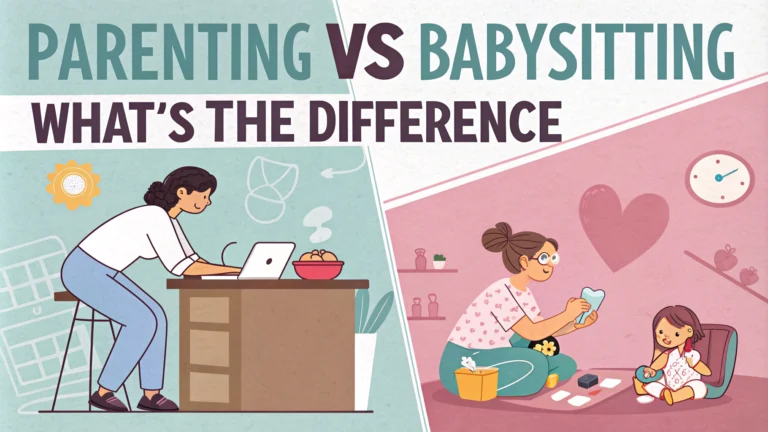The line between parenting and babysitting often gets blurred, especially when family members or close friends are involved. While both roles focus on caring for children, they differ significantly in responsibilities, commitment levels, and long-term impact.
Parents shape their children’s future through consistent guidance and emotional investment, while babysitters provide temporary care and support. These distinct roles complement each other in the childcare ecosystem.
Core Differences Between Parenting and Babysitting
- Time Commitment: Parents provide 24/7 care vs. scheduled hours for babysitters
- Decision Making: Parents make major life choices while babysitters follow set guidelines
- Emotional Investment: Parents form lifelong bonds vs. professional relationships
- Financial Responsibility: Parents bear all costs while babysitters receive payment
Essential Parenting Responsibilities
- Long-term development and education planning
- Healthcare decisions and medical care
- Moral and values education
- Financial planning for child’s future
- Legal responsibilities and advocacy
Professional Babysitting Duties
| Primary Tasks | Secondary Tasks |
|---|---|
|
– Child supervision – Safety monitoring – Basic care needs |
– Light housekeeping – Meal preparation – Homework help |
“Babysitting is a temporary responsibility, while parenting is a lifelong commitment that shapes a child’s future.”
Setting Clear Boundaries Between Different Childcare Roles
Many families struggle to define roles when multiple caregivers are involved in a child’s life. This guide outlines key boundaries and expectations for parents, babysitters, and other caregivers to ensure smooth childcare operations.
Understanding these boundaries helps prevent confusion and maintains healthy relationships between all parties involved.
Establishing Communication Guidelines
- Regular Updates: Daily reports on activities and incidents
- Emergency Protocols: Clear steps for handling urgent situations
- Contact Methods: Preferred ways to reach parents/guardians
Key Areas of Authority
| Parent Authority | Babysitter Authority |
|---|---|
|
– Medical decisions – Discipline methods – Schedule changes |
– Basic safety calls – Minor schedule adjustments – Daily activity choices |
Creating Written Agreements
- Work Hours: Specific start/end times
- Payment Terms: Rates, overtime, expenses
- House Rules: Screen time, visitors, food
- Emergency Contacts: Backup numbers and addresses
Handling Common Challenges
Address issues like schedule changes, discipline disagreements, or payment disputes promptly and professionally. Document all significant incidents and conversations.
“Clear boundaries and open communication create a stable environment for children and caregivers alike.”
Building Trust and Respect
- Maintain professional distances
- Respect privacy boundaries
- Follow through on commitments
- Address concerns directly
Moving Forward Successfully
Regular check-ins and open dialogue help maintain healthy relationships between parents and caregivers. Review and update agreements as needed to reflect changing circumstances.
Document all changes and keep communication channels open for ongoing success.
Frequently Asked Questions About Parenting vs Babysitting
Q: What are the main differences between parenting and babysitting?
A: Parenting involves long-term responsibility, emotional bonding, and legal obligations for a child’s development. Babysitting is temporary childcare, typically paid, with focused responsibilities for safety and basic needs during specific time periods.
Q: Do babysitters have legal rights over children in their care?
A: No, babysitters have limited authority to make decisions. They can only act within the scope given by parents and cannot make legal, medical, or educational decisions unless specifically authorized.
Q: Can babysitting experience prepare you for parenting?
A: While babysitting provides valuable childcare experience, it offers only a glimpse of parenting responsibilities. Key differences include:
- No long-term emotional investment
- Limited decision-making authority
- No financial responsibility
- Temporary nature of care
Q: What responsibilities do parents have that babysitters don’t?
A: Parents have extensive responsibilities including:
- Financial support
- Educational decisions
- Medical care choices
- Emotional development
- Long-term planning
- Legal accountability
Q: How much should babysitters be involved in disciplining children?
A: Babysitters should follow the parents’ established discipline guidelines and avoid implementing their own rules. Major behavioral issues should be reported to parents.
Q: Can long-term babysitters develop parent-like bonds with children?
A: Yes, regular babysitters can form strong emotional connections with children, but these relationships remain professional and temporary compared to parent-child bonds.
Q: What qualifications are needed for babysitting versus parenting?
A: Babysitters often need:
- First aid certification
- CPR training
- References
- Background checks
Parenting has no formal qualifications but carries legal responsibilities.
Q: How does payment differ between parenting and babysitting?
A: Babysitting is a paid service with set hourly rates, while parenting involves personal financial investment in the child’s upbringing.
Q: What are the emotional differences between parenting and babysitting?
A: Parents form permanent emotional bonds and are invested in their child’s entire future. Babysitters maintain professional boundaries while providing care and attention.
Q: Can babysitters make medical decisions for children in emergencies?
A: Babysitters can only make emergency medical decisions if given explicit authorization through a medical release form. Otherwise, they must contact parents or emergency services.



















